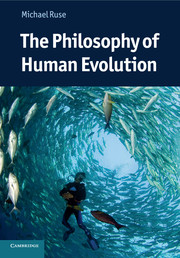7 - Sex, orientation, and race
Published online by Cambridge University Press: 05 June 2012
Summary
In this chapter I want to look at three questions on human nature about which Darwinians have had things to say – things to say that others have not always received entirely favorably. Male–female differences; sexual orientation; and race. Let us take these in turn.
Some background
By “sex” one generally means the biology. Males have beards and penises; females have breasts and vaginas. Males have prostates; women have wombs. Males have an X and a Y chromosome; females have two X chromosomes. (Birds reverse this pattern.) In sexuality, genetic information is being combined in one organism from two earlier organisms. By “gender” one generally means the psychology. Males identify with the biology of males; females with the biology of females. Transsexuals have sex and gender crossed. Most people are obviously not transsexuals and so generally when I use the word “sex” I am including gender. Hermaphrodites have both sexes and need another to reproduce. Asexual organisms do it themselves, without need for others. (Some organisms vary between sexuality and asexuality, according to the season or food supplies or whatever. Overall, these are generally considered sexual, because at some point genetic information is being pooled.) Sexual orientation is about the type of person (sex, which usually coincides with gender) with whom you want to have sex. There is no assumption that someone who wants to have sex with someone of their own sex has any issues about gender. A male homosexual can (and almost always does) feel perfectly comfortable about being a man, and similarly for women.
- Type
- Chapter
- Information
- The Philosophy of Human Evolution , pp. 185 - 224Publisher: Cambridge University PressPrint publication year: 2012

